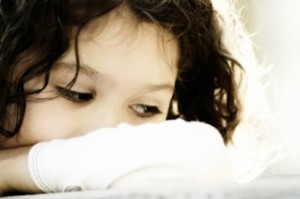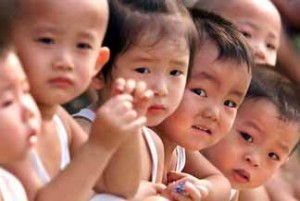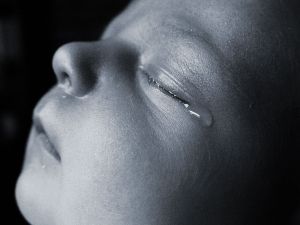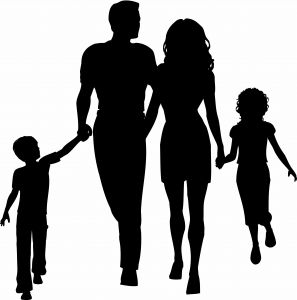This is disturbing.
It’s certainly not the image that comes to my mind when I think of children.
We all want our children to be above reproach. They are our pride. I know mine are.
Their happiness is the pinnacle of our existence. So it should be.
Hence why Jeffrey Kluger’s article “Small Child, Big Worries” in the March 2011 issue of “Time Magazine” struck a nerve in me that’s close to home.
What is it that our society does that permits us to even cause such a thing to happen to our children?
According to psychologists babies could suffer from “Psychological conditions – defiance, aggression, attention deficits….” and the few main symptoms listed were “Crying, tantrums, loss of appetite and clinging to parents.”
What happened to the good old fashioned days of “spare- the-rod and spoil the child” disciplinary technique?
Did that not solve the problem for all kids?
Okay so it’s not the problem of discipline anymore as psychological awareness is open for public discussion nowadays.
Maybe that was the “baby boomers” approach and it worked for them. Gen x and y’s children could be different with the possible  increase in divorce, drug-use and domestic-violence in homes it’s looking a bit more bleak.
increase in divorce, drug-use and domestic-violence in homes it’s looking a bit more bleak.
This article sheds some harsh truth to the reality of what we may not be so aware of.
Depression in adults seems to be made more publicly aware but a chronic illness in babies and children maybe not so much.
It must be some serious stuff if we are addressing psychologically impaired pre-schoolers right?
Not that I want to become indulgently narcissistic about what’s been written in this particular article but it’s a sobering thought that a child’s emotional state can be affected at such an early age, as early as one, and hold such serious ramifications in years to follow.
Even into their adulthood.
Serious offences such as child molestation or domestic violence against children aren’t touched on, moreso the subtle influencing behaviours at home though are.
“Financial struggles, combative parents, substances abuse” cause trauma and hence create an onset of depression in babies and children.
It points out that the cause of depression in babies is still a grey area but genetics do play a role.
Famous Scientist and Evolutionist Charles Darwin’s “Nature versus Nurture Theory” I believe comes into play.
Both facets appear to be crucial.
Apparently obsessive compulsive disorders are hereditary. It’s a tough and sensitive issue when seen in that light.
But what about depression as a chronic mental illness?
I daresay both nature and nurture aspects contribute equally, but environmental factors seem to be the issue here.
And rightly so.
Lifestyle on the home front of who and what children are surrounded by will ultimately affect their behavioural patterns for later life.
It’s inevitable. Traumatic experiences evidently triggers the onset of depression.
The divorce of families causing family separations, adopted children who’ve experienced premature harship with identity crisis struggles (later on in life) and early severe physical illnesses are examples of the possible causes of babiess who suffer from a depressive state.
American Psychologist of Weil Cornell Medical College, Nim Tottenham, conducted a study on 78 adpoted children (babies and children averaging 9 years of age.) He performed magnetic brain resonance-imaging scans and discovered that they wouldn’t keep still and they squirmed and were restless, 50% of these orphans had spent their early lives in orphanages.
They even ran behavioural tests on the kid’s “emotional-regulation” skills. Overall the children who had been adopted showed a more significant amygdalae (the bodily function responsibe for responses to senses such as fear) than non-adopted children.
Daunting statistics shown in this article highlight, “41% of pre-schoolers with an anxiety condition were still impaired by it four years later” and “Children with preschool depression were 6 times likelier than other kids to have the condition later on in childhood.”
More supporting evidence shows that “10% share of kids from birth to 3 years old with a psychiatric Impairment – about the same as adults and “90% of preschoolers impared by anxiety, depression or both are still impaired when they reach school age.”
This study affirms the correlation between adopted children and the possible continuation of depression from early childhood transiting into adulthood.
It is disheartening but not surprising.
However children adopted or not are just as susceptible to depression.
It would be bias and presumptuous to assume that only adopted children are diagnosed with this disorder.
It seems that the nurturing and environmental factors do support this outcome to all babies and children alike.
It is worrying.
Our little bundles of joy don’t deserve to experience depression.
No parent wants to see their child go through it.
Heaven forbid the poor little darlings don’t want to either!
Thankfully there are preventative ways to abstain from the onset of depression.
Well to sum it up common sense prevails.
My instincts tell me that it comes down to good old- fashioned family values.
Protecting our children’s best interest with a nurturing environment, plenty of love, security, emotional stability void of harm in any way.
Married or single.
Biological offspring or not.
It’s about maintaining our children’s happiness and pyschological well-being to the best of our ability.
Ensuring their happiness is key.
As pyschologist Edward Zigler of the Yale University School of medicine puts it, “There is a phenomenon called attunement… “It’s that dance of swans between parent and baby.” (Mums and dads should practice that very well because before you know it their children dance away from them completely.)
Here is a biblical reference, in my mind a universal one too, to encourage all families with children, “And now this word to all of you: You should be like one big happy family, full of sympathy toward each other, loving one another with tender hearts and humble minds.”
Let’s work together to ensure our children don’t become another statistic in the world of pyschological illness.
Love and security go a long way.

